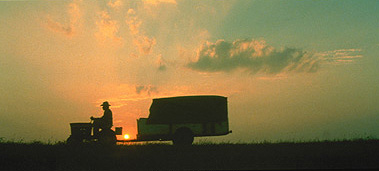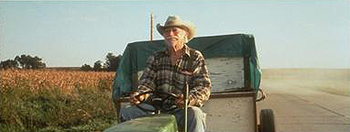The Straight Story


David Lynch has a new movie? Uh, okay. After his recent efforts (Lost Highway, Twin Peaks: Fire Walk With Me), a new Lynch film needs to be viewed with trepidation. Hey, the film is for Disney. Huh? And, it's rated G. Wait - David Lynch? The man who loves strange, grotesque imagery (Eraserhead, The Elephant Man), violent, sudden outbursts of violence (Blue Velvet), general weirdness (Twin Peaks, On the Air), and prolonged female frontal nudity? Well, it's true. And The Straight Story, the true story about Alvin Straight (who sadly passed away in 1996) on the surface seems far away from Lynch's typical stomping ground, but upon closer inspection, is Lynch at his finest. The story centers on Alvin Straight (Richard Farnsworth, Spartacus, Misery, and tons of other films). Straight and his brother Lyle have not spoken in ten years. When Straight receives a call that Lyle was stricken with a stroke, he decides that it is time to mend things with his brother.
Alvin Straight is a proud man. His hips are bad, but he refuses to use a walker, instead opting for two canes. His eyesight is bad, so he lost his license. He will not accept a ride to Mt. Zion, Wisconsin, where his brother is. Instead, he decides to ride his lawnmower from his home in Laurens, Iowa, to Mt. Zion, a trek of over 250 miles. It is something that he must do, in order to make things right. Along they way, Straight encounters a number of different people, from a young runaway, to a group of bicyclists, to a John Deere salesman, and through his conversations, he touches all of them in a very special way. Straight comes from a simpler time, when the delineation between bad and good was clear. He is very trusting, soft spoken, and always willing to help. Farnsworth gives a towering performance full of both emotion and love, which pulls on every heartstring that you have. His Alvin Straight is very powerful, especially in light of the subdued nature of Straight. His lines are delivered with a grace that can only be achieved after decades of fine work in the industry.
The other actors also give fine performances. Lynch enjoys using actors he has worked with before, and it is good to see Everett McGill (Big Ed from Twin Peaks) again. Harry Dean Stanton (Twin Peaks: Fire Walk With Me, Wild At Heart) does an exceptional job with a role that is much too small. Sissy Spacek (Affliction, Blast From The Past) does well as Alvin Straight's mentally deficient daughter, but her accent becomes extremely predictable after a couple minutes. Not only does Lynch enjoy working with the same actors, but also with many of the same production crew. The script was written by John Roach and Mary Sweeney (Sweeney worked with Lynch on many of Lynch's movie and television projects). Producers Neal Edelstein, Pierre Edelman, Michael Polaire, designers Patricia Norris, Jack Fisk, d.p. Freddie Francis, and numerous others are all Lynch familiars. Angelo Badalamenti, Lynch's usual choice for scoring, composes a marvelous score for The Straight Story, reminiscent of his work for Twin Peaks. At times, the music is ethereal and wispy, then changes to a more ominous tone. But for the most part, the music follows a simple melody that plays while Straight continues on his journey.
Lynch is a painter, and has a talented eye. Many scenes are shot from a far distance, with nothing much more than the majestic scenery. The camera reverentially flies over the rolling cornfields of Iowa, taking in each stalk waving gently with the wind. Little details are present in all of the scenes. Small dogs run through the streets of Laurens. The painted lines on the road move slowly under the mower. Here are the things that quickly identify the movie as 'Lynchian.' A large woman slowly eats a pink Sno-Ball. A grain elevator hums with electricity (a frequent Lynch theme). A blue ball rolls slowly along the sidewalk. The Straight Story moves as fast as the 5 miles per hour that the John Deere tractor is capable of, but is thoroughly engrossing. It is more than just a journey to see a sick brother, it is a spiritual odyssey across the heartland of America. Truly a magnificent piece of art.